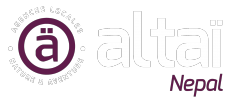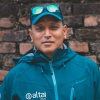Everest, along the first footprints of the Sherpas...
Itinerary
-
Day 1 Arrival in Kathmandu
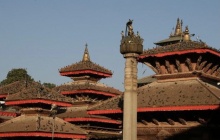 Arrive at the Kathmandu International Airport. Welcome by Altaï Nepal team and transfer to our hotel. Dinner together with our trip leader, who will give you some important information on the adventure ahead.
Arrive at the Kathmandu International Airport. Welcome by Altaï Nepal team and transfer to our hotel. Dinner together with our trip leader, who will give you some important information on the adventure ahead.
Accomodation: Hotel
M -
Day 2 Route: Katmandou - Phaplu (2600 m) et Chiwang (2700 m)
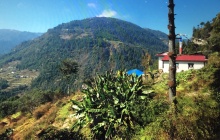 After an early breakfast, we drive to Phaplu located in the east of Nepal, from where we start our trek in the Sherpa country. It’s a spectacular road crisscrossing a long stretch of hilly Nepal. In Phaplu, we meet our porters. It’s our first day of the trek and we walk up to the village of Chiwang from where we have a beautiful view of Mt. Numbur Himal (6959 m).
After an early breakfast, we drive to Phaplu located in the east of Nepal, from where we start our trek in the Sherpa country. It’s a spectacular road crisscrossing a long stretch of hilly Nepal. In Phaplu, we meet our porters. It’s our first day of the trek and we walk up to the village of Chiwang from where we have a beautiful view of Mt. Numbur Himal (6959 m).
Ascent: +100m
Trek: 1h30
Accommodation: Lodge -
Day 3 Chiwang - Ringmo (2900 m) - Taksindu (3000 m)
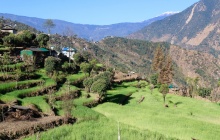 Today, we come across many villages and it’s an easy day of the trek. We walk in a forest of fir trees and rhododendrons and reach Ringmo in the middle of apple trees where we meet the historic trail linking Jiri and Lukla. Then, a gradual climb leads us to the small pass of Taksindu La (3050 m) from where you can appreciate the Himalayan range: Thamserku (6608 m), Mera Peak (6476 m), Numbur Himal (6959 m), before descending to the village of Taksindu. Option: Early in the morning, optional climb to Chiwang Gompa (monastery), overlooking the valley (1h30 of additional walk).
Today, we come across many villages and it’s an easy day of the trek. We walk in a forest of fir trees and rhododendrons and reach Ringmo in the middle of apple trees where we meet the historic trail linking Jiri and Lukla. Then, a gradual climb leads us to the small pass of Taksindu La (3050 m) from where you can appreciate the Himalayan range: Thamserku (6608 m), Mera Peak (6476 m), Numbur Himal (6959 m), before descending to the village of Taksindu. Option: Early in the morning, optional climb to Chiwang Gompa (monastery), overlooking the valley (1h30 of additional walk).
Ascent/Descent: +450m/-100m
Trek: 5h
Accommodation: Lodge. -
Day 4 Taksindu (3050 m) - Nunthala - Khari Khola (2040 m).
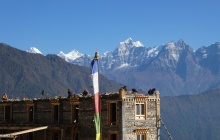 You descend through Nunthala to the Dudh Khosi river - literally the milky river. We cross the river on a suspension bridge then reach the village of Jubing. We then continue our walk amidst beautiful terraced crops all the way up to Khari Khola.
You descend through Nunthala to the Dudh Khosi river - literally the milky river. We cross the river on a suspension bridge then reach the village of Jubing. We then continue our walk amidst beautiful terraced crops all the way up to Khari Khola.
Ascent/Descent: +720m/-1550m
Trek : 5h30
Accommodation: Lodge. -
Day 5 Khari Khola - Bupsa - Paiya (2730 m)
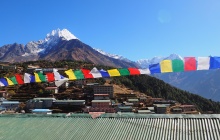 We climb up a quite steep trail to Bupsa, again through terraced agricultural hillsides. We trek through a large mixed forest of oaks, bamboos and pines. It’s a day if trek with many small uphill and downhill sections to reach the village of Paiya, where we stay overnight.
We climb up a quite steep trail to Bupsa, again through terraced agricultural hillsides. We trek through a large mixed forest of oaks, bamboos and pines. It’s a day if trek with many small uphill and downhill sections to reach the village of Paiya, where we stay overnight.
Ascent/Descent : +600m/-100m
Trek : 6h30
Accommodation: Lodge. -
Day 6 Paiya - Phakding (2600 m)
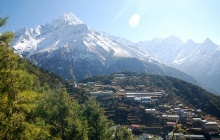 It’s an easy day of trek today. We cross many Sherpa villages, enjoying green landscapes with crop fields and farms. We continue the day through a gently upward trail until Chhaubas then climb down through a mixed forest of the firs, pines, bamboos and oaks until Surke. We then continue walking up to Phakding, a typical village below Lukla.
It’s an easy day of trek today. We cross many Sherpa villages, enjoying green landscapes with crop fields and farms. We continue the day through a gently upward trail until Chhaubas then climb down through a mixed forest of the firs, pines, bamboos and oaks until Surke. We then continue walking up to Phakding, a typical village below Lukla.
Ascent/descent: +1135m/-980m
Trek : 6
Accommodation: Lodge -
Day 7 Phakding - Namche Bazar (3440 m)
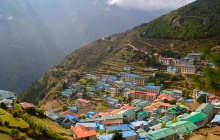 This day begins with a walk along the Dudh Kosi. The path climbs gently. Several times we cross the river, pass the village of Jorsale (2805 m) and then start a steep climb to Namche Bazar. Half an hour later, we can see the Everest. We arrive in Namche early enough to discover this famous village Sherpa and its inhabitants. Some Tibetan shops and traders sell jewelery and craft products from Tibet. Every week there is an important market in Namche, where the peasants in the neighborhood sell their crops of wheat, corn, millet, etc.
This day begins with a walk along the Dudh Kosi. The path climbs gently. Several times we cross the river, pass the village of Jorsale (2805 m) and then start a steep climb to Namche Bazar. Half an hour later, we can see the Everest. We arrive in Namche early enough to discover this famous village Sherpa and its inhabitants. Some Tibetan shops and traders sell jewelery and craft products from Tibet. Every week there is an important market in Namche, where the peasants in the neighborhood sell their crops of wheat, corn, millet, etc.
Ascent/descent : +900m/-50m
Trek hours : 5
Accommodation : Lodge. -
Day 8 Namche Bazar. Acclimatization Day
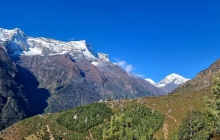 Free day in Namche, the most important city in the region. Numerous lodges and restaurants are AVAILABLE for this starting point of trek towards Everest. It is the ideal place to rest and acclimatize to the high altitude, before undertaking this hike. According to YOUR desire, a half-day hike on the heights of Namche Bazar: villages of Khunde and Khumjung (3780 m), landscapes of mountain pastures, and small well-ordered fields. We can admire the sunset over the Ama Dablam, Nuptse and the Everest over Namache (1 hour hike) !!!
Free day in Namche, the most important city in the region. Numerous lodges and restaurants are AVAILABLE for this starting point of trek towards Everest. It is the ideal place to rest and acclimatize to the high altitude, before undertaking this hike. According to YOUR desire, a half-day hike on the heights of Namche Bazar: villages of Khunde and Khumjung (3780 m), landscapes of mountain pastures, and small well-ordered fields. We can admire the sunset over the Ama Dablam, Nuptse and the Everest over Namache (1 hour hike) !!!
Accommodation : Same Lodge.
-
Day 9 Namche Bazar - Tengboche (3867m)
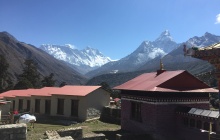 After breakfast, we set out towards Tengboche. Today is a wonderful day with view of high and great mountains throughout the trek: Mt. Everest, Mt. Nuptse, Mt. Lhotse and Mt. Ama Dablam rise against a blue skyline. The panoramic view from Tengboche is considered one of the most scenic places in the world. We follow a relatively smooth trail with few ups and downs. We may also spot wild animals such as musk deer, Himalayan Thar and Nepali’s national bird “the Himalayan pheasant.” The trail then follows smoothly through the pine forests before we cross the Dudh Koshi River. After lunch, we have a slightly tougher climb till Tengboche. The reward is great: from Tengboche, we enjoy a great close view of Mt Ama Dablam, Mt Nuptse and Mt Everest. After some rest, visit the Buddhist Monastery of Tengboche, the biggest in the Everest Region.
After breakfast, we set out towards Tengboche. Today is a wonderful day with view of high and great mountains throughout the trek: Mt. Everest, Mt. Nuptse, Mt. Lhotse and Mt. Ama Dablam rise against a blue skyline. The panoramic view from Tengboche is considered one of the most scenic places in the world. We follow a relatively smooth trail with few ups and downs. We may also spot wild animals such as musk deer, Himalayan Thar and Nepali’s national bird “the Himalayan pheasant.” The trail then follows smoothly through the pine forests before we cross the Dudh Koshi River. After lunch, we have a slightly tougher climb till Tengboche. The reward is great: from Tengboche, we enjoy a great close view of Mt Ama Dablam, Mt Nuptse and Mt Everest. After some rest, visit the Buddhist Monastery of Tengboche, the biggest in the Everest Region.
Trek: 6h
Altitude gain +617m
Altitude loss -190m
Accommodation: Lodge -
Day 10 Tengboche - Monjo (2845m)
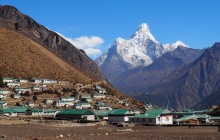 We then take the path back down through rhododendron forests to the banks of the Dudh Koshi. We descend to Phakding, nestled in the valley of Dudh Khosi before returning to Lukla.
We then take the path back down through rhododendron forests to the banks of the Dudh Koshi. We descend to Phakding, nestled in the valley of Dudh Khosi before returning to Lukla.
Ascent: +650m/1270m Trek: 6 - 7 hours
Accommodation: Lodge -
Day 11 Monjo - Lukla (2850m)
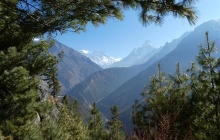 Today, we descend to Phakding, nestled in the valley of Dudh Khosi before returning to Lukla.
Today, we descend to Phakding, nestled in the valley of Dudh Khosi before returning to Lukla.
Elevation: +650m/1270m
Walking: 6 - 7 hours
Accommodation: Lodge -
Day 12 Flight Lukla - Ramechap. Drive to Kathmandu
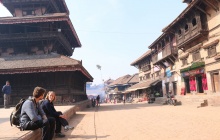 This morning, we catch a flight to Ramechhap and drive to Kathmandu. In clear weather, the views of the Himalayan mountains are spectacular. We Stop for lunch on the way. We visit Bhaktapur on the way, a sumptuous pedestrian city located 15 km from Kathmandu ... the most beautiful of the three imperial cities of the valley Transfer to hotel.
This morning, we catch a flight to Ramechhap and drive to Kathmandu. In clear weather, the views of the Himalayan mountains are spectacular. We Stop for lunch on the way. We visit Bhaktapur on the way, a sumptuous pedestrian city located 15 km from Kathmandu ... the most beautiful of the three imperial cities of the valley Transfer to hotel.
Flight: 30 Mins
Drive: 4 hours
Accommodation : Hotel
Meals not included -
Day 13 Guided tour of the Kathmandu valley
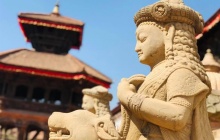 Accompanied by our guide, we discover the jewels of the valley of Kathmandu and Bhaktapur, a pedestrian city located 15 km from Kathmandu. Visit the most beautiful of the three imperial cities of the valley. After lunch, we visit Pashupatinath, a Hindu site dating back to the 12th century, a...
Accompanied by our guide, we discover the jewels of the valley of Kathmandu and Bhaktapur, a pedestrian city located 15 km from Kathmandu. Visit the most beautiful of the three imperial cities of the valley. After lunch, we visit Pashupatinath, a Hindu site dating back to the 12th century, a...
Accommodation : Hotel
Meals not included -
Day 14 End of stay
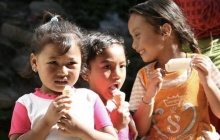 End of stay
End of stay
Dates & prices
International departures:
No departure for now
Trip code: NEPSAG-EN
Included
- All in-country transfers as detailed in itinerary
- 3 * hotel and B&B accommodation in Kathmandu (Hotel Tibet, Manaslu or similar)
- Domestic flights: Lukla - Kathmandu
- Trek includes full-board in lodging
- English-speaking Altaï Guide
- Visits as per itinerary: with a cultural guide by private vehicle
- Luggage transfers: up to 12kg maximum per person during the trek
- Trekking support team: assistants and porters
- Trekking permits: Sagarmatha National Park and TIMS
- Staff Insurance
Not included
- Entrance to historical sites & monuments
- Meals (8 - 10 USD per meal)
- Nepalese visa: US $ 25
- International flights
- Insurance: Repatriation, Medical & Helicopter Services
- Drinks, tips and personal expenses - all that is not in "THE PRICE INCLUDES"
Notes
Level 4/5
Terms and conditions
Inscription
Facturation
Annulation
- Cancellation received more than 30 days prior to the departure date: a sum of €50 per person will be retained
- Cancellation received 30 to 21 days before the departure date: your deposit, 30% of the total trip price will be retained
- Cancellation received 20 to 14 days before the departure date: 50% of the total trip price will be retained
- Cancellation received 13 to 7 days before the departure date: 75% of the total trip price will be retained
- Cancellation received less than 7 days before the departure date: 100% of the total trip price will be retained
- Fixed airfares: if your airline ticket was issued in advance, often done to avoid significant surcharges, you will be charged 100% of any non-refundable fees if you wish to change or cancel your flight plan.
- Fixed in-country costs: early charges for firm bookings will be charged if you cancel or modify your trip.
- Insurance costs: if you have taken out comprehensive or cancellation insurance, the cost of insurance is due and cannot be refunded.
Modification du contrat
Prix et révision des prix
Cession du contrat
Insurance
Practical info
Staff
Food
Accommodation
Transportation
Budget & exchange
Tips
Vital equipment
- Warm Sleeping Bag
- Water purifiers (micropur, aguatabs ...)
- A cap or sunhat
- 1 or 2 sets of thermals: long-sleeved thermal tops and full-length long johns
- Long sleeved and short sleeved t-shirts, preferably in quick-drying technical material
- A light fleece or equivilent (plus extra warm layers if necessary)
- A breathable wind proof, waterproof jacket (Gore-Tex...)
- Lightweight waterproof over trousers
- Suitable shorts
- Walking trousers
- A pair of high-rise walking boots - strength, good grip of the foot and ankle (high stems) and impermeability are essential. Choose shoes with non-slip soles (vibram).
- A pair of trainers/sandels or equivilent casual shoes for cities, villages and evenings
- Thick walking socks
- Warm gloves, hat and scarf (it can be chilly in the mountains)
- Your personal toiletries and a fast drying towel
- Water bottle(s). Min. 2 litres, light and isothermal
- A good pair of sunglasses (think min. category 3)
- Sun-cream, face and lips
- Head torch and spare batteries
- A pocket knife
- A pair of hiking poles
- A waterproof bag cover (or plastic bags) to protect your belongings
- Toilet paper
- Anti-bacterial hand gel
- Your camera
- Notebook or travel diary
Material
- No cotton
- Always carry dry spares of everything, including underwear and gloves
- A warm breathable base layer
- A second thermal layer
- Wind and water proof protective outer layers
Luggage
- A rucksack (35-40L or 45-50L) for use as a day bag. This will contain your (vital) personal belongings for the day (sweater, spare t-shirt, water bottle, picnic-lunch, sunglasses, small things ... )
- We use porters to transport our other belongings when trekking. Please bring a flexible travel bag with zips for easy access max 80L and max 13kg (16kg with camping gear). Please do not bring suitcases or other hard bags which the porters cannot transport.
- You may also be able to store some belongings securely at the hotel in Kathmandu.

